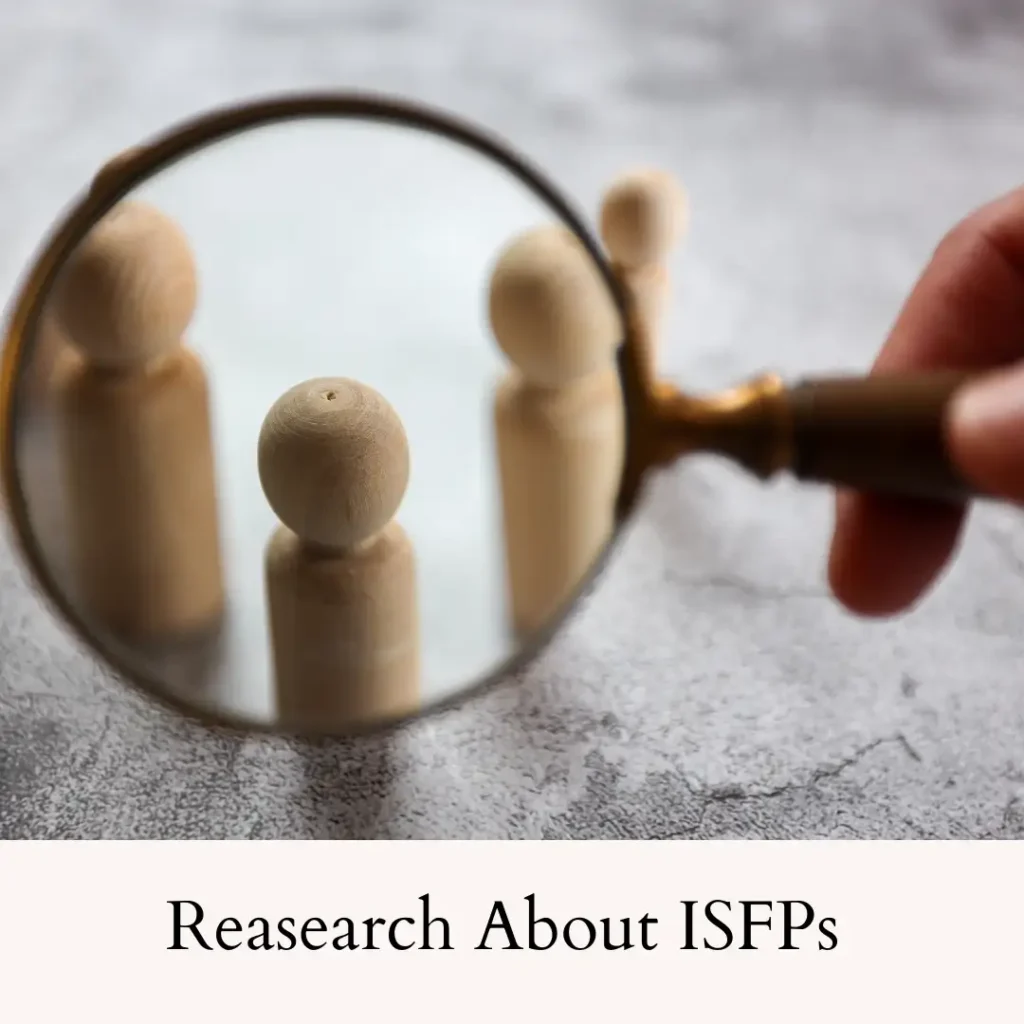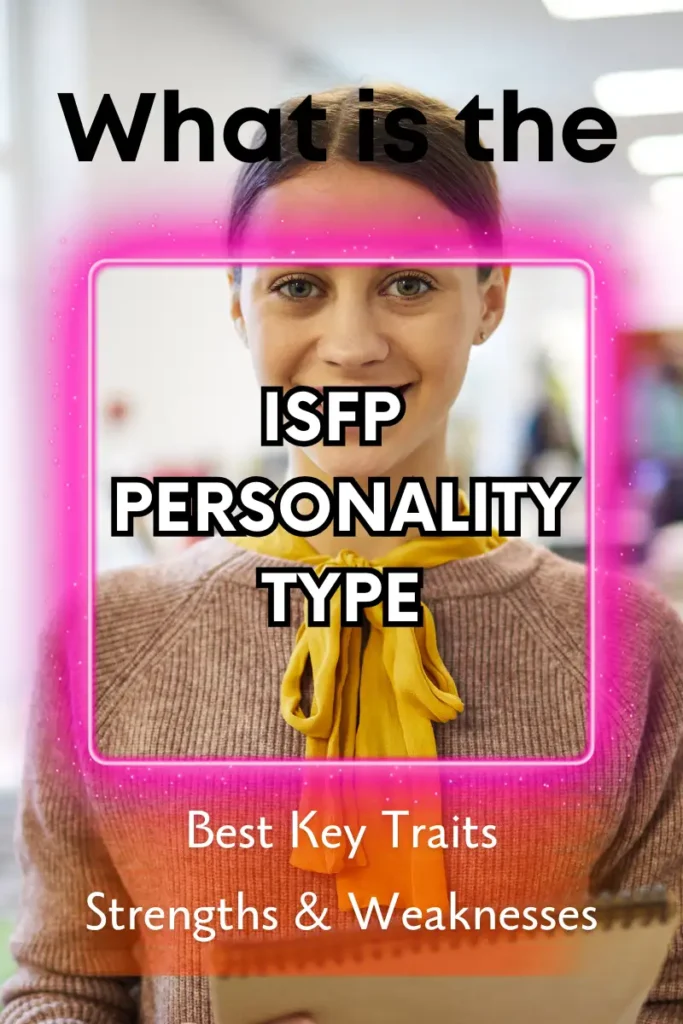The ISFP personality type, often referred to as “The Adventurer,” is a blend of creativity, empathy, and spontaneity that makes it one of the most unique in the Myers-Briggs® Type Indicator (MBTI) framework.
ISFPs are known for their appreciation of beauty, both in the world around them and in their personal experiences.
They thrive on exploring, experimenting, and living in the moment.
With a deep connection to their values and an innate sense of compassion, the ISFP personality type brings warmth, artistry, and authenticity to everything they do.
Whether you’re an ISFP or curious about understanding one, this guide will dive into the traits, strengths, challenges, and growth opportunities for the ISFP personality type.
Table of Contents
Understanding the ISFP Personality Type
The ISFP personality type is one of the 16 types defined by the Myers-Briggs Type Indicator (MBTI). Known as “The Adventurer,” ISFPs have a unique approach to life, balancing their need for personal expression with a sensitivity to others.
Unlike more structured personality types, ISFPs are highly adaptable, valuing freedom and spontaneity over rigid routines.
They are deeply connected to the present, observing life through a lens of curiosity and creativity.
The ISFP personality type often finds joy in beauty, from art to nature, and brings a compassionate touch to their relationships and experiences.
What Does ISFP Stand For
Each letter in the ISFP acronym stands for a core trait that shapes this personality type:
- Introverted (I): ISFPs are introspective, drawing energy from within and feeling most at ease in calm, intimate settings.
- Sensing (S): ISFPs are grounded in the present, with a keen awareness of sensory details, making them particularly attuned to beauty and aesthetics.
- Feeling (F): ISFPs prioritize emotions and values, making decisions based on what feels right rather than pure logic.
- Perceiving (P): ISFPs prefer flexibility and spontaneity, opting to explore their options rather than conforming to strict plans.
The Adventurer: A Brief Overview

Known as “The Adventurer,” the ISFP personality type brings a love for exploration, self-expression, and authentic living to all they do.
ISFPs find joy not just in big thrills but in appreciating the beauty of small moments, whether it’s through nature, art, or meaningful connections.
They thrive in spontaneous, flexible environments where they can follow their passions and stay true to their values, often expressing their creativity in deeply personal ways.
With a gentle curiosity, ISFPs engage the world openly, bringing compassion and a sense of wonder to each experience. In relationships, they’re loyal and understanding, valuing genuine connections and living life with an adventurous, heartfelt spirit.
Core Traits of the ISFP Personality Type
The ISFP personality type, or “The Adventurer,” is defined by a set of traits that make them uniquely empathetic, creative, and attuned to their surroundings. ISFPs bring a quiet depth to their interactions, prioritizing authenticity and a genuine connection with the world. Here are the core traits that define the ISFP personality type:
Artistic and Creative

ISFPs are naturally drawn to beauty and self-expression, making creativity one of their most defining characteristics.
Whether through visual arts, music, crafts, or personal style, ISFPs find unique ways to express their inner world.
This creativity often goes beyond traditional forms of art; ISFPs may bring an artistic flair to problem-solving, finding unconventional and innovative solutions.
They often appreciate the aesthetic details in their environment, seeing the world through a lens that highlights color, form, and harmony.
This trait allows them to leave a personal touch on everything they do, setting them apart as visionaries in both everyday life and the arts.
Empathetic and Sensitive

ISFPs are highly empathetic, with an innate ability to understand and share the feelings of others.
This sensitivity makes them deeply compassionate individuals who genuinely care about the well-being of those around them.
They often pick up on subtle emotional cues, making them particularly attuned to the needs and feelings of their loved ones.
ISFPs’ empathy also means they can easily feel the emotional atmosphere of a room, helping them provide comfort and support where it’s needed most.
However, this sensitivity can sometimes lead to emotional overwhelm, as they may absorb the emotions of others without realizing it.
Spontaneous and Flexible

The ISFP personality type is characterized by a strong preference for flexibility and spontaneity.
ISFPs dislike rigid plans and schedules, preferring instead to keep their options open and adapt to the moment.
This trait allows them to embrace new experiences and handle changes with ease, making them highly adaptable in various situations.
They often approach life with a “go with the flow” attitude, ready to follow their curiosity and explore new paths as they emerge.
This openness makes ISFPs adventurous and willing to take risks, especially when pursuing something meaningful or exciting.
Reserved Yet Warm

ISFPs are often quiet and introspective, but they possess a warmth and openness that draws people in.
They tend to be reserved, especially in large social settings, but once they feel comfortable, they reveal a kind, gentle, and genuine personality.
ISFPs are selective about whom they trust, often building deep, loyal connections with a close circle of friends or family.
When they do open up, ISFPs are known for their sincerity and thoughtfulness, making them cherished companions.
This trait also gives them a unique balance; they’re both private and deeply connected, valuing both independence and meaningful relationships.
Values Personal Freedom

Independence is essential for the ISFP personality type, as they highly value their personal freedom.
ISFPs dislike being constrained by rules or external expectations, preferring instead to live life on their own terms.
This independence fuels their creativity and allows them to follow their passions without feeling restricted.
They are often guided by their own set of values, which they uphold with great conviction.
This freedom-seeking nature can make it challenging for ISFPs to commit to situations that feel overly controlled, as they prioritize authenticity and individuality in all areas of life.
Together, these core traits form the essence of the ISFP personality type.
ISFPs are thoughtful and creative individuals who bring warmth, empathy, and a sense of adventure to their lives and relationships.
Driven by a desire to live in harmony with their values, ISFPs navigate the world with a quiet courage and an open heart, making them one of the most compassionate and authentic types in the Myers-Briggs personality spectrum.
Strengths of the ISFP Personality Type
The ISFP personality type is known for a unique set of strengths that make them compassionate, adaptable, and highly attuned to the sensory experiences around them.
These strengths help ISFPs create meaningful relationships, excel in creative pursuits, and navigate life in a grounded, authentic way. Here are some of the key strengths that define the ISFP personality type:
Empathy and Compassion

ISFPs possess a natural empathy that allows them to connect deeply with others, understanding their emotions and perspectives on an intuitive level.
This compassion makes ISFPs highly supportive friends, partners, and family members, as they can sense when someone needs comfort, even if it isn’t directly expressed.
Because they feel emotions so vividly, ISFPs are often able to provide a safe, understanding space for others to be vulnerable.
This emotional depth also allows ISFPs to excel in caregiving roles or fields where emotional intelligence is valued, as they bring genuine care to every interaction.
Creativity and Artistic Talent

One of the most prominent strengths of the ISFP personality type is their creativity.
ISFPs have a keen eye for aesthetics, often using art, music, fashion, or other creative outlets as a means of self-expression.
This creativity isn’t only confined to traditional artistic fields; ISFPs bring an imaginative perspective to problem-solving, finding unique, sometimes unconventional solutions to challenges.
Their ability to see beauty in the ordinary allows ISFPs to create works that resonate emotionally with others, making them talented artists, designers, or creatives who bring originality and personal meaning to their work.
Adaptability and Flexibility

ISFPs are highly adaptable individuals who thrive in situations that allow them to remain flexible.
They handle change well, preferring to go with the flow rather than adhering to strict routines or expectations.
This adaptability makes ISFPs excellent at adjusting to new environments, ideas, or roles.
They are open to new experiences and often seek out opportunities to expand their understanding of the world.
ISFPs’ spontaneous approach to life helps them navigate unexpected challenges with grace and ease, making them well-suited to roles that require quick thinking and a dynamic outlook.
Attention to Detail and Sensory Awareness

ISFPs have a remarkable attention to sensory details, which enables them to appreciate the small joys and intricacies of life.
This acute sensory awareness allows them to be fully present, noticing things others might overlook.
ISFPs often find satisfaction in hands-on activities, as they are attuned to colors, textures, sounds, and other sensory experiences.
This strength also makes ISFPs highly observant, which can be advantageous in fields requiring precision or quality control, as they can catch minor details that contribute to an overall sense of beauty or harmony.
Grounded and Practical

While ISFPs are known for their artistic inclinations, they are also grounded and practical in their approach to life.
They prefer realistic, hands-on solutions to abstract theories and enjoy working in environments where they can see tangible results.
This grounded nature helps ISFPs make decisions based on practicality and experience, allowing them to handle everyday responsibilities with a calm, straightforward approach.
They are typically good at balancing their dreams with real-world demands, finding ways to pursue their passions while staying in tune with what is realistically achievable.
These strengths make the ISFP personality type a unique blend of empathy, creativity, and groundedness.
ISFPs bring a warm, understanding presence to their relationships and a sense of authenticity to their work.
Their ability to adapt, combined with a rich inner world of values and ideals, helps them live life fully and expressively, inspiring others with their sincerity and appreciation for life’s little details.
Weaknesses of the ISFP Personality Type
While the ISFP personality type possesses numerous strengths, there are also certain weaknesses that can challenge them in various aspects of life.
These weaknesses often stem from their high sensitivity, a desire for personal freedom, and a strong emphasis on the present moment.
By understanding these potential pitfalls, ISFPs can work to balance their tendencies and cultivate a more grounded approach to their relationships, careers, and self-development. Here are some key weaknesses of the ISFP personality type:
Difficulty with Long-Term Planning

ISFPs are naturally inclined to live in the moment, which allows them to fully experience and appreciate each day.
However, this focus on the present can make it difficult for them to engage in long-term planning.
ISFPs may struggle with setting and following through on long-term goals, finding it challenging to adhere to structured plans or strict timelines.
This weakness can sometimes lead to missed opportunities or difficulty advancing in careers that require a steady commitment over time.
ISFPs may benefit from setting small, manageable milestones to help them stay focused without feeling overwhelmed by the bigger picture.
Over-Sensitivity to Criticism

As highly sensitive individuals, ISFPs often take criticism to heart, even if it is constructive.
Their strong emotional depth and attachment to personal values can make any form of critique feel deeply personal.
This sensitivity may cause them to withdraw or feel discouraged when receiving feedback, potentially hindering their growth.
ISFPs may avoid situations where they could face judgment, leading to missed learning opportunities or challenges in workplace environments where feedback is essential.
Building resilience and learning to view criticism as a tool for self-improvement can help ISFPs navigate this weakness more effectively.
Struggle with Assertiveness and Setting Boundaries

Due to their empathetic and caring nature, ISFPs often find it difficult to assert themselves or set clear boundaries.
They have a strong desire to avoid conflict and may prioritize the needs of others above their own, sometimes at the cost of their well-being.
This tendency can lead to situations where ISFPs feel taken advantage of or become emotionally drained, as they may take on too much to please others.
Developing assertiveness skills and learning to say “no” when needed can empower ISFPs to maintain their boundaries, preserving their energy for relationships and activities that genuinely align with their values.
Tendency to Avoid Conflict

ISFPs are peace-loving and gentle, preferring harmony over confrontation.
While this trait is often seen as a strength, it can also lead to issues when they avoid necessary conflicts.
ISFPs may avoid addressing problems or speaking up about their needs to keep the peace, which can result in unresolved issues or unexpressed frustrations.
In relationships and at work, this tendency to sidestep conflict can prevent them from advocating for themselves or establishing clarity.
Learning to approach conflict in a calm, constructive manner can help ISFPs express their needs without feeling that they are disrupting harmony.
Inconsistent Motivation

ISFPs’ motivation can be deeply tied to their personal interests, mood, and immediate environment, leading to periods of intense passion followed by times of disengagement.
They may struggle with maintaining motivation in tasks or projects that don’t resonate with them emotionally, which can impact their productivity and consistency.
In careers or academic pursuits that require sustained effort over time, this inconsistency can be a disadvantage.
ISFPs can benefit from developing routines or finding ways to connect tasks with their values, helping them sustain interest and commitment, even in areas that don’t initially captivate their interest.
These weaknesses, while challenging, also offer ISFPs opportunities for growth and self-discovery.
By becoming aware of these areas, ISFPs can work to develop greater resilience, assertiveness, and balance, ultimately leading to a more fulfilling and harmonious life.
Embracing self-improvement while staying true to their authentic, compassionate nature can help ISFPs navigate these weaknesses while continuing to share their unique gifts with the world.
15 Words that Best Describe the ISFP Personality Type:
Artistic
Compassionate
Flexible
Empathetic
Spontaneous
Sensitive
Adaptable
Warm
Authentic
Observant
Independent
Adventurous
Gentle
Expressive
Free-Spirited
Bold
Cognitive Functions of the ISFP Personality Type
The following table displays the whole cognitive function stack for the ISFP personality type.
| SL No. | Roles | Cognitive Functions |
| 1. | Dominant/Hero/Heroine/Leading | Introverted Feeling (Fi) |
| 2. | Auxiliary/Good Parent/Supportive | Extraverted Sensing (Se) |
| 3. | Tertiary/ Relief/ Eternal Child | Introverted Intuition (Ni) |
| 4. | Inferior/Aspirational/Anima or Animus | Extraverted Thinking (Te) |
| 5. | Opposing/Villian/Backup | Extraverted Feeling (Fe) |
| 6. | Critical Parent/Witch/Senex/Discovery | Introverted Sensing (Si) |
| 7. | Trickster/Blind/Deceiving/Comedic | Extraverted Intuition (Ne) |
| 8. | Demon/Devilish/Angelic/Transformative | Introverted Thinking (Ti) |
Key Communication Traits of the ISFP Personality Type

Here are the key communication traits of the ISFP Personality type:
Empathetic Listening
ISFPs excel at listening deeply and empathetically. They pick up on unspoken cues, making others feel genuinely heard and understood. People often confide in ISFPs, knowing they’ll receive a compassionate response.
Non-Confrontational and Harmonious
ISFPs avoid confrontation, preferring a calm, peaceful atmosphere. They communicate gently and thoughtfully, steering away from topics that could cause tension. This makes them appear diplomatic but sometimes means they hold back their true opinions.
Expressive Through Actions Over Words
ISFPs prefer to show their feelings through actions rather than words. Small gestures, like helping out or being present, convey their loyalty and care. This “show, don’t tell” approach highlights their authentic and practical side.
Attuned to Nonverbal Cues
ISFPs are highly sensitive to body language and facial expressions, allowing them to gauge emotions without words. They intuitively adjust their responses, creating a comfortable environment where others feel understood.
Reserved and Thoughtful in Sharing
Private by nature, ISFPs prefer not to share openly until they feel trust. When they do speak, they choose their words carefully, making conversations with them thoughtful and meaningful.
Reluctant to Engage in Debate
ISFPs typically avoid debates, as they value harmony over argument. They prefer understanding over heated discussions, which can make them hesitant to engage in confrontational conversations.
Key Learning Traits of the ISFP Personality Type

Here are the key learning traits of the ISFP Personality type:
Hands-On and Experiential
ISFPs learn best through hands-on experiences rather than theoretical concepts. They prefer practical, real-world applications that allow them to engage directly and see tangible results.
Sensory and Detail-Oriented
ISFPs are highly attuned to sensory details, making them excellent at absorbing visual or physical information. They remember details better when learning involves sight, sound, or touch.
Personal Interest Driven
ISFPs excel when learning topics that resonate with their personal interests and values. When they’re genuinely passionate about a subject, they’re more focused, dedicated, and eager to explore it in depth.
Independent Learners
ISFPs enjoy the freedom to explore subjects at their own pace. They dislike rigid structures and prefer environments that allow them autonomy and flexibility in how they approach learning.
Visual and Artistic Approach
Being naturally creative, ISFPs often approach learning with a visual or artistic mindset. They benefit from images, diagrams, and examples that allow them to visualize information rather than relying solely on text or lectures.
Value Practicality Over Theory
ISFPs prefer learning that has practical applications they can use in their everyday life. They often disengage from overly theoretical material and thrive when they see clear, real-world uses for what they’re learning.
Key Leadership Traits of the ISFP Personality Type

Here are the key Leadership Traits of the ISFP Personality Type:
Lead by Example
ISFPs prefer to lead through actions rather than words. They show others how to work with integrity and dedication, inspiring their team by embodying the values they hold dear.
Supportive and Empathetic
ISFP leaders are highly empathetic, making them approachable and understanding. They genuinely care about their team’s well-being, often going out of their way to provide support and encouragement.
Flexible and Adaptable
ISFPs bring a flexible approach to leadership, adapting to changing circumstances and respecting different perspectives. This adaptability helps them respond effectively to challenges without rigidly sticking to one method.
Low-Key and Humble
Rather than seeking the spotlight, ISFP leaders focus on the work itself and their team’s success. They are humble, prioritizing the needs of the group over personal recognition.
Encouraging Personal Growth
ISFPs value individuality and encourage others to find their strengths. As leaders, they create a supportive environment that helps team members develop their own unique skills and talents.
Avoid Micromanaging
ISFP leaders prefer to trust their team and avoid micromanaging. They provide guidance when needed but allow individuals the freedom to explore solutions, fostering an atmosphere of respect and independence.
Key Friendship Traits of the ISFP Personality Type

Here are the key Friendship Traits of the ISFP Personality Type:
Loyal and Devoted
ISFPs are loyal friends who deeply value their close relationships. They stand by their friends through thick and thin, offering unwavering support and dedication.
Supportive Listeners
As empathetic listeners, ISFPs create a safe space for friends to share their feelings. They listen without judgment, providing comfort and understanding without pushing advice.
Present in the Moment
ISFPs enjoy spending quality time with friends and are fully present in each moment. They appreciate simple, shared experiences, bringing warmth and authenticity to every interaction.
Respectful of Independence
ISFPs respect their friends’ autonomy and don’t impose their opinions. They value individuality and give their friends space to grow, allowing each relationship to develop naturally.
Kind and Non-Judgmental
Known for their gentle, accepting nature, ISFPs avoid judging others. Friends feel comfortable being themselves around ISFPs, knowing they’ll be met with kindness and understanding.
Enjoys Shared Experiences
ISFPs love sharing meaningful activities, whether it’s exploring nature, attending art events, or simply relaxing together. They thrive in friendships that involve mutual interests and experiences that create lasting memories.
Key Love & Intimacy Traits of the ISFP Personality Type

Here are the key Love & Intimacy Traits of the ISFP Personality Type:
Romantic and Expressive
ISFPs are naturally romantic and enjoy expressing affection in thoughtful, heartfelt ways. They’re known for small, meaningful gestures that show their love in unique and memorable ways.
Attentive to Partner’s Needs
ISFPs are highly attuned to their partner’s emotions and needs. They pay close attention to what makes their partner happy and often go out of their way to bring joy and comfort to the relationship.
Values Emotional Connection
Deep emotional connection is essential for ISFPs in a relationship. They seek authentic, meaningful bonds and are fully committed to understanding their partner on a deeper level.
Gentle and Patient
ISFPs are gentle and patient with their partners, respecting each person’s boundaries and pace. They bring calm and reassurance to the relationship, making it easy for their partner to feel safe and valued.
Passionate Yet Private
While ISFPs are passionate lovers, they are also private and reserved, especially about their feelings. They open up deeply only with those they trust completely, creating a strong, intimate bond with their partner.
Live in the Moment with Love
ISFPs focus on the present moment, enjoying spontaneous, loving interactions. They bring warmth and joy to their relationships, creating memorable, cherished experiences with their partner.
Suitable Careers for the ISFP Personality Type

Here are the suitable careers for the ISFP Personality type:
Artist
With a natural creative flair, ISFPs excel in careers that allow them to express themselves artistically. They thrive as painters, sculptors, illustrators, or photographers, bringing personal meaning and emotion to their art.
Designer (Interior, Fashion, or Graphic)
ISFPs’ keen eye for detail and aesthetics makes them excellent designers. Whether in fashion, interior, or graphic design, they enjoy creating visually appealing and harmonious environments.
Musician or Performer
Music and performance offer ISFPs a chance to express their feelings and connect with others. Many ISFPs find fulfillment in musical careers, acting, or other performance-based roles where they can share their talents.
Chef or Culinary Artist
ISFPs enjoy hands-on, sensory-rich experiences, making the culinary arts a great career choice. As chefs, bakers, or food stylists, they find satisfaction in creating beautiful and delicious dishes.
Nurse or Healthcare Professional
With their empathetic nature, ISFPs are well-suited to healthcare roles like nursing, occupational therapy, or physical therapy. They bring a caring, patient approach to helping others heal and feel comfortable.
Wildlife Conservationist or Environmental Scientist
ISFPs are often connected to nature and may feel drawn to careers that protect it. Working as conservationists, environmental scientists, or park rangers allows them to combine their love of the outdoors with meaningful work.
Physical Therapist or Occupational Therapist
ISFPs’ sensitivity to others’ needs and their hands-on approach make them ideal for roles in physical and occupational therapy. They find satisfaction in helping people recover and regain their quality of life.
Veterinarian or Animal Care Worker
Animal care offers ISFPs a chance to work with creatures they love in a caring, practical way. Veterinarians, animal behaviorists, and shelter workers are natural fits for their compassionate personality.
Photographer or Videographer
ISFPs have a strong visual sense, and photography or videography lets them capture beauty in the world around them. These careers offer creative freedom and allow ISFPs to work independently.
Social Worker or Counselor
ISFPs’ empathetic nature makes them well-suited for counseling or social work, where they can make a difference in people’s lives. Their calm, accepting demeanor helps clients feel understood and supported.
These careers align with the ISFP personality type’s strengths, values, and preferred work styles, allowing them to express their creativity, compassion, and practicality in meaningful ways.
Famous ISFPs and ISFP Celebrities
Here is the list of all the famous ISFPs and ISFP Celebrities:
Michael Jackson

Known as the “King of Pop,” Michael Jackson was an innovative performer who expressed his creativity through groundbreaking music, dance, and visual storytelling, captivating audiences worldwide with his emotional depth and artistry.
Bob Dylan

A legendary singer-songwriter, Bob Dylan is celebrated for his poetic lyrics and unique voice, using his art to challenge societal norms and express complex emotions, all while staying true to his quiet and introspective nature.
Wolfgang Amadeus Mozart

A prolific composer, Mozart displayed the ISFP’s deep sensitivity and love for beauty, creating music that continues to resonate centuries later with its emotional intensity and intricate compositions.
Jimi Hendrix

As a revolutionary guitarist, Hendrix brought raw emotion and spontaneity to his music, captivating listeners with his soulful, boundary-pushing performances and unique sound.
Jessica Alba

Known for her roles in film and her entrepreneurial spirit, Jessica Alba combines her creative talents with a compassionate approach, especially evident in her commitment to health and wellness with The Honest Company.
Bob Ross

The beloved painter and TV host, Bob Ross used his calm demeanor and artistic skills to inspire millions to find joy in art, sharing a peaceful, expressive approach to creativity that reflected his gentle personality.
Jim Morrison

The enigmatic frontman of The Doors, Jim Morrison channeled his introspective, adventurous spirit into his music and lyrics, leaving a legacy as a symbol of rebellion, self-expression, and emotional depth.
Christina Aguilera

With her powerful voice and expressive performances, Christina Aguilera embodies the ISFP’s artistic side, bringing passion and authenticity to her music and advocating for self-expression and empowerment.
Shraddha Kapoor
A versatile actress in Bollywood, Shraddha Kapoor combines her natural charm and sensitivity with a love for creativity, bringing warmth and depth to her performances on screen.
Steven Spielberg

As one of Hollywood’s most iconic directors, Spielberg’s storytelling is filled with emotional resonance and visual beauty, capturing his ISFP traits of empathy, imagination, and a desire to connect with audiences through impactful narratives.
Frida Kahlo

A renowned Mexican painter, Frida Kahlo expressed her inner world and emotions through vivid, symbolic self-portraits.
Known for her raw and introspective approach, she used art to explore identity, pain, and resilience, leaving a powerful legacy as an icon of authenticity and self-expression.
Her work resonates deeply with the ISFP personality type, reflecting a profound sensitivity, creativity, and passion for individuality.
Tips for the ISFP Personality Type for Balance & Personal Growth

Set Small, Achievable Goals
ISFPs often prefer spontaneity over structure, but setting small goals can provide direction. Breaking down larger tasks into manageable steps helps maintain focus without feeling overwhelming.
Practice Assertiveness
ISFPs may struggle to express their needs. Practicing assertiveness can help them establish boundaries and communicate more openly, ensuring their voice is heard without sacrificing harmony.
Embrace Self-Care
Because ISFPs are highly attuned to others, they can neglect their own needs. Regular self-care activities, like mindfulness, creative hobbies, or nature walks, can recharge them and maintain emotional balance.
Challenge Comfort Zones
ISFPs often enjoy staying within familiar spaces but benefit from exploring new areas of growth. Whether it’s learning a new skill or trying out a different hobby, stepping outside their comfort zone fosters confidence.
Find Constructive Outlets for Emotions
ISFPs experience emotions deeply and can benefit from creative outlets to process them. Activities like journaling, painting, or music help express feelings in healthy ways, promoting emotional well-being.
Set Time for Reflection
With their focus on the present, ISFPs may overlook long-term aspirations. Taking time to reflect on their goals and values helps them connect present actions with future outcomes and achieve personal growth.
Seek Balance Between Independence and Connection
While ISFPs value their independence, nurturing relationships is also essential. Balancing alone time with meaningful connections supports both their desire for freedom and their need for companionship.
Develop Problem-Solving Skills
ISFPs can improve resilience by building problem-solving skills. Tackling challenges with a practical mindset helps them manage stress and approach obstacles without feeling overwhelmed.
Learn to Accept Constructive Feedback
Feedback can feel personal to ISFPs, but learning to view it as a tool for growth is beneficial. Constructive criticism provides insights for personal development and new perspectives.
Celebrate Achievements, Big and Small
ISFPs may sometimes downplay their accomplishments. Taking time to acknowledge and celebrate both big and small wins boosts self-confidence and reinforces progress.
By incorporating these tips into their lives, ISFPs can enjoy a more balanced, fulfilling path that aligns with their values and enhances personal growth. Embracing self-care, setting boundaries, and cultivating self-confidence help them thrive in both personal and professional arenas.
Research Describing the ISFP Personality Type

The following data is taken from the MBTI® Manual – Third Edition.
Here are 10 interesting facts about the ISFP Personality Type:
Strong Sense of Loyalty and Security at Work
The ISFP personality type places high value on loyalty and security in their work environments. They prefer roles with clear structures and a strong sense of stability, rather than constantly shifting tasks or high-pressure responsibilities.
Low Assertiveness in College Settings
College students with the ISFP personality type report some of the lowest levels of assertiveness. They may avoid confrontation and prefer to handle stress quietly, which sometimes makes them less likely to stand out in competitive environments.
Unique Coping Mechanisms for Stress
ISFPs often cope with stress by “trying to avoid stressful situations,” “sleeping,” or “watching TV.” Unlike types that actively face challenges, ISFPs often seek comfort in quiet activities, allowing them to process emotions in a low-stress way.
Preference for Practical Skills in Education
In academic settings, the ISFP personality type leans toward practical skills over theoretical subjects. They are less interested in abstract learning and tend to gravitate toward hands-on, applied knowledge that directly impacts their daily lives.
Ranked Highest in “Emotional Exhaustion” and “Depersonalization”
The ISFP personality type ranks high in emotional exhaustion and feelings of depersonalization. Their sensitivity and empathetic nature can lead to burnout, especially in emotionally intense situations.
Underrated Creative Potential
While ISFPs are naturally creative, especially in fields like art and design, they sometimes rank among the lowest on general measures of creativity in structured educational settings. This is likely because their creativity thrives in freedom rather than rigid frameworks.
Strong Focus on Happy Family Values
ISFPs place a high value on family happiness, often prioritizing close personal relationships over career ambition. In the workplace, they may seek roles that allow them to maintain a work-life balance and spend quality time with loved ones.
Avoidance of Conflict
The ISFP personality type tends to avoid conflict in both personal and professional settings. This peace-seeking approach is rooted in their preference for harmony, making them more likely to steer away from confrontation whenever possible.
High Representation Among Substance Abuse Programs
ISFPs are overrepresented in substance abuse programs, particularly among males. This may stem from their tendency to internalize stress and avoid directly confronting difficult emotions, leading them to seek external coping mechanisms.
Low Satisfaction with “Job Security” and “Salary”
ISFPs often express dissatisfaction with factors like job security, promotions, and salary. This personality type seeks fulfillment through meaningful work rather than traditional measures of success, leading them to value roles that align with their personal ethics and passions over high pay.
Conclusion

The ISFP personality type is one of warmth, creativity, and authenticity.
Known as “The Adventurer,” ISFPs navigate life with a deep appreciation for beauty, personal freedom, and meaningful experiences.
Their empathetic and sensitive nature allows them to connect deeply with others, while their spontaneous and adaptable approach helps them thrive in dynamic, hands-on environments.
Although they may avoid conflict and struggle with assertiveness, ISFPs bring a gentle strength and unwavering loyalty to their relationships.
In work and personal growth, ISFPs benefit from environments that honor their values and allow them to express themselves creatively.
They may find true satisfaction in careers that align with their sense of purpose rather than conventional markers of success.
Overall, ISFPs bring a unique blend of compassion, artistry, and practicality, adding a refreshing and nurturing presence wherever they go.
Understanding and embracing these qualities helps ISFPs achieve a balanced and fulfilling life that celebrates their individuality and connection with the world around them.
If you enjoyed this post, don’t forget to check these!
INFP Personality Type: Best Key Traits, 8 Strengths, and Weaknesses
INFJ Personality Type: Best Key Traits,5 Strengths and Weaknesses
ENFP Personality Type: Best Key Traits, 8 Strengths and Weaknesses
If you found this information helpful, share it with someone who needs it. Also, let me know your thoughts below in the comment section.

